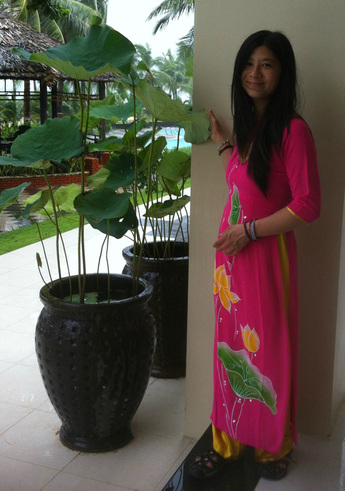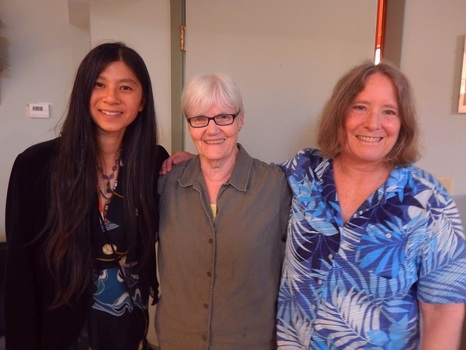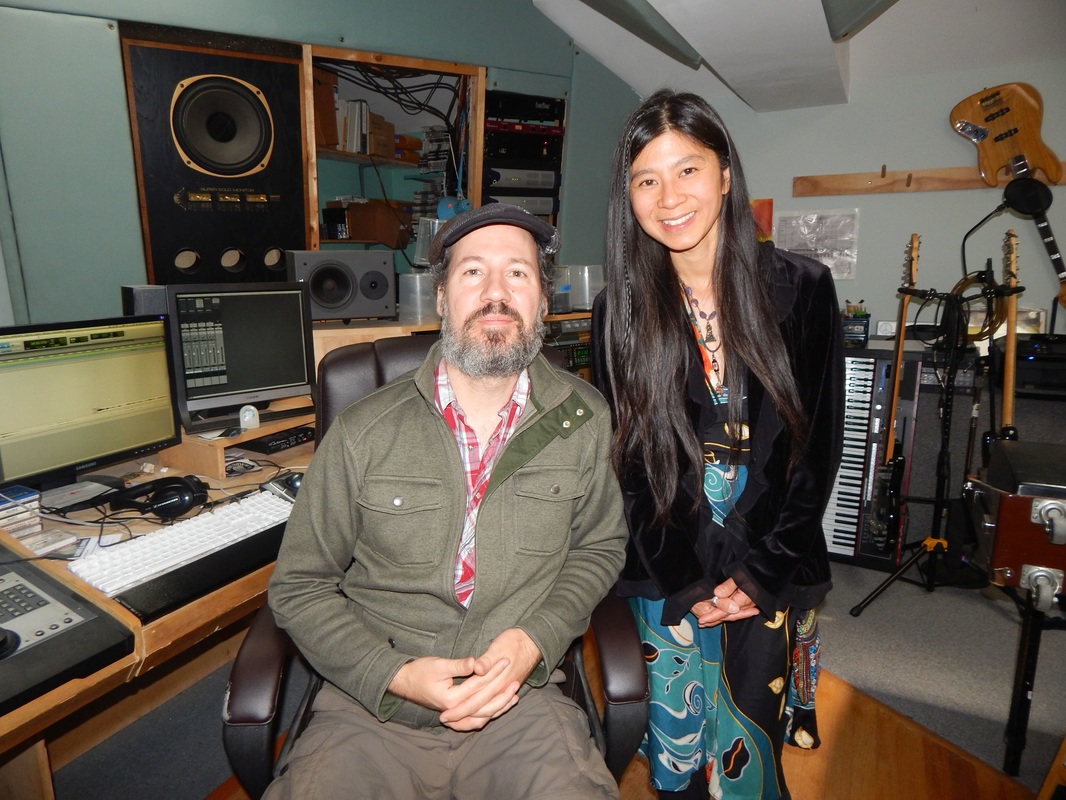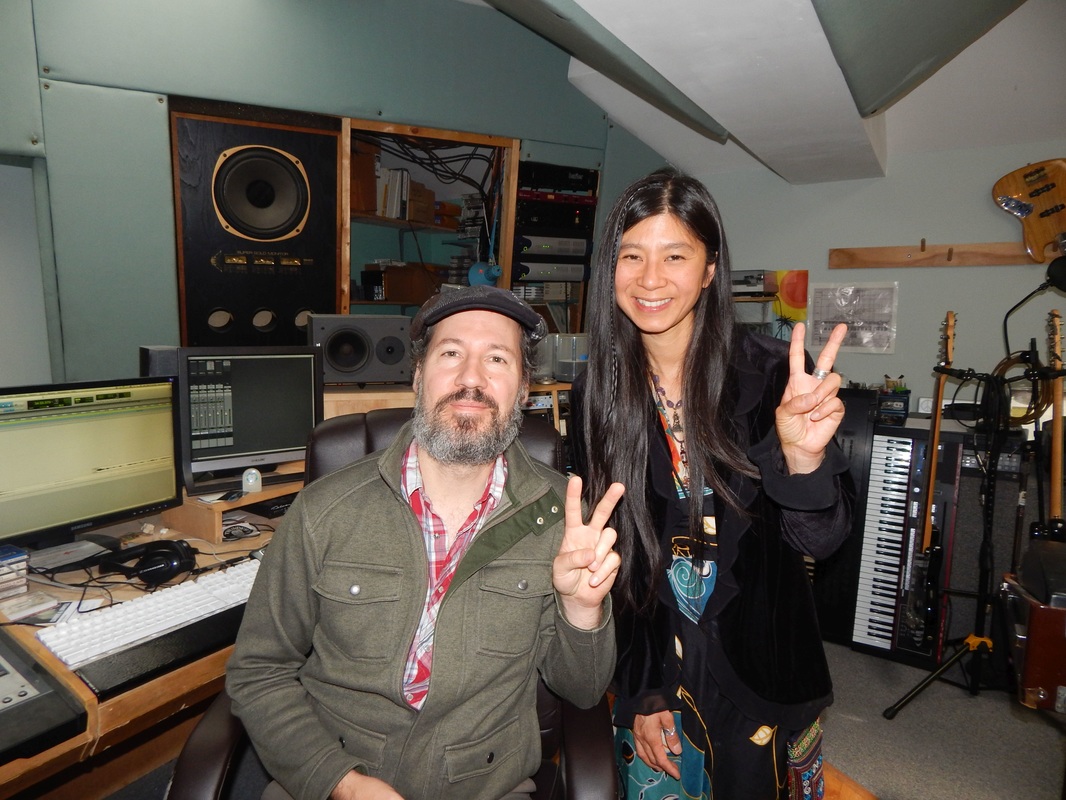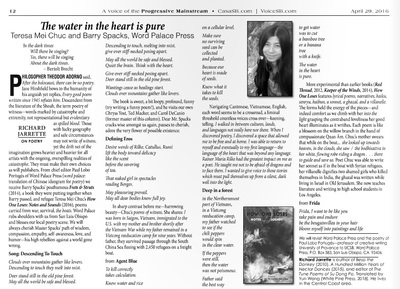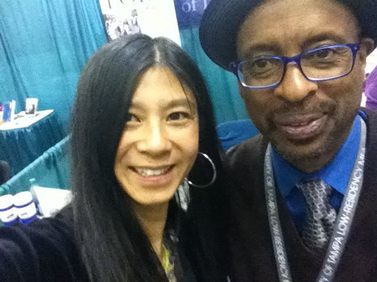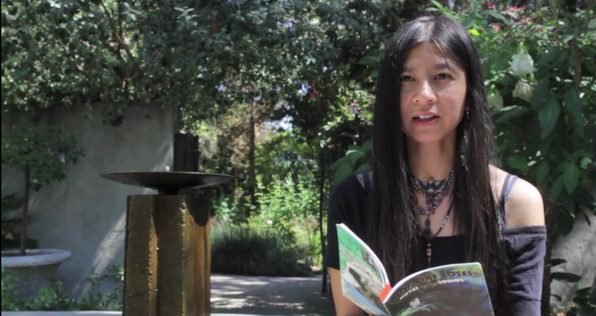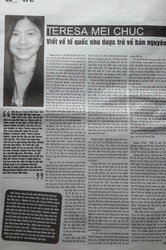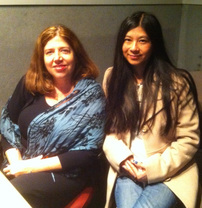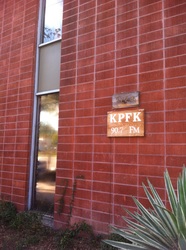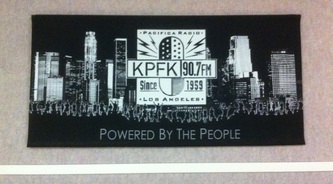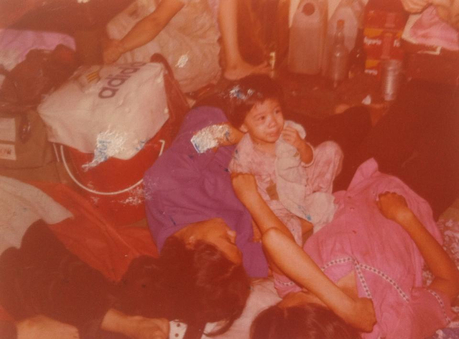Sợi chỉ đỏ
Sift. Shift. Lift. Interview with Chúc Mỹ Tuệ (aka Teresa Mei Chuc)
https://siftshiftlift.substack.com/p/36620608-44b8-401b-a745-ec90d7bf49bd
The Writer in the World: "The Art of Loving,"
Teresa Mei Chuc's blogpost, is published in Goddard College's blog.
http://thewriterintheworld.com/the-art-of-loving/
Spider Road Press
Interview with Teresa Mei Chuc
http://spiderroadpress.com/pulling-the-red-thread-an-interview-with-poet-teresa-mei-chuc/
Welcome to Your Life
Episode #11: Teresa
interview hosted by Christian Nuno
Out of Bounds Radio Show - WEOS 89.7 FM & 90.3 FM (Geneva, NY)
& WSKG 89.3 FM (Binghamton, NY)/90.9 FM (Ithaca, NY)
features an interview and poetry reading
with Teresa Mei Chuc
Press Release
The Out of Bounds Radio Show with Tish Pearlman
http://outofboundsradioshow.com/
we feature poet/publisher and educator
Teresa Mei Chuc
Chuc was born in Saigon and immigrated to the US under political asylum
with her mother and brother after the Vietnam war. She is a graduate of Goddard
College and is author of two full-length collections of poetry, Red Thread and
Keeper of the Winds. Her most recent collection, and what we'll be
discussing, is a chapbook called How One Loses Notes and Sounds. This beautiful
and powerful collection continues Chuc's exploration of the lasting legacy of
the Vietnam war for her and her family.
Broadcast Dates and Times:
Sat., July 30, 2016 at 3:30 pm: WEOS-FM ( 90.3 & 89.5 Geneva region)
Live Stream: WEOS.org Live Stream
Sun., August 7, 2016 at 11:30 am: WSKG-FM 89.3 Binghamton, 90.9 Ithaca 91.7 Cooperstown/Oneonta, 91.1 Corning/Elmira, 88.7 Hornell/Alfred) WSKG.org Live Stream
"The Water In the Heart is Pure," Richard Jarrette's Review of How One Loses Notes and Sounds by Teresa Mei Chuc /Interview
appears in VOICE MAGAZINE
(a.k.a. CASA MAGAZINE) online and in print
(Santa Barbara, California)
April 29, 2016 Edition, page 12
Please click on image to enlarge
Poet E. Ethelbert Miller's Radio Show
with Teresa Mei Chuc
ON THE MARGIN (WPFW 89.3 FM)
airing on Thursday, April 21, 2016 at 9 a.m. Eastern
http://wpfwfm.org/radio/
WPFW 89.3 FM
1990 K St NW; Suite 14R Washington, DC 20006
tricycle: The Buddhist Review
features Teresa Mei Chuc's poems
and her talk on the connection between the creative process
and Buddhism for National Poetry Month
April 11, 2016
Rattle Interview with Teresa Mei Chuc, author of Red Thread
A Vietnamese translation of the Rattle interview with Teresa Mei Chuc, author of Red Thread, translated by Nhật Linh, appears in Vannghe Tre Literary Arts Magazine published by the Vietnam Writers Association, editor Phong Diep, on April 27, 2013 in Vietnam. Click here to read the interview in Vietnamese. The interview (in Vietnamese) is also published online on Phong Diep http://phongdiep.net/default.asp?action=article&ID=17787
Featured Interview - Literature Radio Show, Sex and Politics
hosted by Joseph Wade with guest host Ed Kearns, Brooklyn, N.Y., Featured interview and reading (online live) from Brooklyn College - Teresa Mei Chuc, Friday, October 19, 2012, 7 p.m. east coast time. Listen to the podcast here http://sexandpolitics.podbean.com/2012/10/21/teresa-mei-chuc/
CounterPunch: Doug Valentine's Political Poetry series
Interview with Teresa Mei Chuc, Friday, October 11, 2013. http://www.counterpunch.org/2013/10/11/poetry-and-transformation/
Poets Cafe KPFK 90.7 FM
Interview with Teresa Mei Chuc
KPFK 90.7 FM, Pacific Radio Los Angeles hosted by Lois P. Jones, recorded on December 8, 2013. Part One of the interview aired on Wednesday, August 27, 2014 at 8:30 p.m. Part
Two aired on Wednesday, November 26, 2014 at 8:00 p.m. Part Two re-aired on Wednesday, December 24, 2014 at 8:30 p.m. The interview and poetry reading with Teresa Mei Chuc is archived on Poets Cafe's webpage https://www.loispjones.com/teresa-mei-chuc/
Two aired on Wednesday, November 26, 2014 at 8:00 p.m. Part Two re-aired on Wednesday, December 24, 2014 at 8:30 p.m. The interview and poetry reading with Teresa Mei Chuc is archived on Poets Cafe's webpage https://www.loispjones.com/teresa-mei-chuc/
KPFK Poets Cafe - Interview and poetry reading with Teresa Mei Chuc (Part One)
hosted by Lois P. Jones & produced by Marlena Bond
TIME: Wednesday, August 27, 2014 @ 8:30 p.m. PST
PLACE: Livestream: www.kpfk.org or 90.7 fm Los Angeles and KPFK 90.7 FM Los Angeles / 98.7 FM Santa Barbara
KPFK Poets Cafe - Interview and poetry reading with Teresa Mei Chuc
Parts One and Two
(Part Two begins at 24:13)
hosted by Lois P. Jones & produced by Marlena Bond
TIME: Wednesday, December 24, 2014 @ 8:30 p.m. PST, Poets Cafe Part Two with Teresa Mei Chuc
PLACE: Livestream: www.kpfk.org or 90.7 fm Los Angeles and KPFK 90.7 FM Los Angeles / 98.7 FM Santa Barbara
PLACE: Livestream: www.kpfk.org or 90.7 fm Los Angeles and KPFK 90.7 FM Los Angeles / 98.7 FM Santa Barbara
"...Teresa Mei Chuc's book of poems, Red Thread is one of the most important contemporary collections on the subject of war and specifically the Viet Nam war from a deeply personal perspective. This is a two part program which will air in 2014." - Lois P. Jones, KPFK 90.7 FM, Poets Cafe
Lois P. Jones and Teresa Mei Chuc
Photo by Marlena Bond at KPFK 90.7 FM studio
Los Angeles, CA
Photo by Marlena Bond at KPFK 90.7 FM studio
Los Angeles, CA
Author Interview, 2014
Red Thread and Keeper of the Winds
Teresa Mei Chuc
Interviewed by Geosi Gyasi, Ghana, West Africa
http://geosireads.wordpress.com/2014/11/19/interview-with-teresa-mei-chuc-author-of-keeper-of-the-winds/
(published on November 19, 2014)
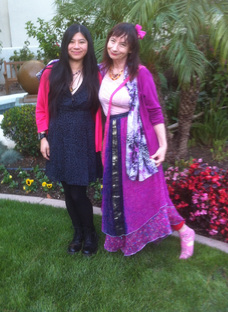 Teresa Mei Chuc & Kathabela Wilson
Teresa Mei Chuc & Kathabela Wilson
Mapping The Artist: Teresa Mei Chuc
Interviewed by Kathabela Wilson
December 13, 2014
ColoradoBoulevard.net
http://coloradoboulevard.net/mapping-artist-teresa-mei-chuc/
Teresa Mei Chuc
Mapping The Artist Revisited
http://coloradoboulevard.net/mapping-the-artist-teresa-mei-chuc-revisited/
Interviewed by Kathabela Wilson
December 13, 2014
ColoradoBoulevard.net
http://coloradoboulevard.net/mapping-artist-teresa-mei-chuc/
Teresa Mei Chuc
Mapping The Artist Revisited
http://coloradoboulevard.net/mapping-the-artist-teresa-mei-chuc-revisited/
Interview between Teresa Mei Chuc and her father on her father’s experience surviving nine years in a Vietcong Reeducation Camp.
February 1, 2015, 8:23 a.m.
Translated from the original Cantonese into English by Teresa Mei Chuc.
Click here to read the full interview
February 1, 2015, 8:23 a.m.
Translated from the original Cantonese into English by Teresa Mei Chuc.
Click here to read the full interview
"Surviving a Vietcong Reeducation Camp"
Excerpt of an interview between Teresa Mei Chuc and her father on her father's experience surviving nine years in a Vietcong Reeducation Camp,
published by Coloradoboulevard.net
Read the excerpt here
Excerpt of an interview between Teresa Mei Chuc and her father on her father's experience surviving nine years in a Vietcong Reeducation Camp,
published by Coloradoboulevard.net
Read the excerpt here
Interview between Teresa Mei Chuc and her mother
on their experience surviving three and a half months
in the South China Sea on “Hai Hong,” a freight boat that carried
about 2,450 Vietnamese refugees escaping Vietnam in 1978.
Interview date: February 3, 2015, 5:06 p.m.
Translated from the original Cantonese into English by Teresa Mei Chuc.
Click here to read the interview
Teresa Mei Chuc is the little girl who is crying on the boat. Her mother is wearing
pink and her aunt is wearing purple. They spent three and a half months in the
South China Sea on a freight boat carrying about 2,450 Vietnamese refugees.
pink and her aunt is wearing purple. They spent three and a half months in the
South China Sea on a freight boat carrying about 2,450 Vietnamese refugees.
The Writer in the World - Goddard College
Teresa Mei Chuc's blogpost, "The Art of Loving Poetry," is published online in Goddard College's blog,
The Writer in the World http://thewriterintheworld.com/2016/03/the-art-of-loving/
The Writer in the World http://thewriterintheworld.com/2016/03/the-art-of-loving/
Author Interview
Red Thread by Teresa Mei Chuc
(Fithian Press, 2012)
Your poetry is clearly autobiographical, and much of it concerns your family. Is the importance of family something shared by other people of Vietnamese heritage?
During and after the Vietnam War, many Vietnamese were separated from their family or killed. Children were burying the dead. Family members left to fight in the war for the Army of the Republic of Vietnam or for the Vietcong and some never came back. I think many Vietnamese in Vietnam and refugees or immigrants in the U.S. and elsewhere around the world felt the importance of family either by losing a family member, losing a homeland, or being separated from family members during and after the war.
Also, ancestral worship or reverence to ancestors is important in Vietnamese culture, there is a deep sense of duty. So, even those that have died in the family are continually present and remembered. They continue to bless and protect the family. We pay respect to our ancestors yearly on the day of their death and sometimes in daily prayers with incense. Pictures of ancestors are placed on the altars along with the bodhisattvas. So, family is an extension of our own bodies and souls.
Do you think the bond of family is especially strong for those who have experienced war?
When you and your loved ones are so close to death and in the midst of war, you realize what is most important and that is family and those you love. You get right to the essence. These are the people who you will live and die for and the people who give you strength, the people who are there for you. War can threaten all that is most important to you, so the bond of family can become very strong. In war, many families are torn apart due to being sent to fight or due to death. Afterwards, families are separated due to immigration to different countries. Many didn’t survive the harrowing journey in boats facing illness, starvation, pirate attacks. My family, luckily, survived the war and its aftermath. We are very grateful to still be together in the same city and we are there for one another.
You and your family experienced immigration first-hand. Has this experience affected your feelings and opinions about the plight of refugees from other cultures, who are seeking safety and a better life in the United States?
I think I am empathetic towards other immigrants who seek safety and a better life in the United States. I have been a public school teacher for seven years and most of my students are from Mexico, El Salvador, and Guatemala, and many of them escaped the violence of gangs and drug wars in their country to seek a better life in the U.S. I feel the importance of keeping our borders open for those in need. I feel strongly that immigrants contribute greatly to our country in terms of language, culture, foods, ideas, perspectives, and all people should be embraced as part of our human family. I’ve met so many immigrants who work so hard to make a better life for themselves and their children, and their contributions and their children’s contributions to our society are invaluable. It can be challenging to adjust to a new life and to build a new life in a new country, but many people persevere under the most difficult of circumstances.
I think, as immigrants, different countries are our homes. The country we left and the country where we live. There can be a feeling of not really belonging anywhere, but there can also be a feeling of belonging everywhere. I think everyone, but perhaps especially the immigrant, struggles with the question of “who am I?” and “what language belongs to me?”, “what culture(s) belong(s) to me?.” It can be an alienating situation, but it can also be an opportunity to embrace new, open spaces both physically and within our hearts, both of the past and present. It is a fracture in the heart, but it takes a fracture, sometimes, to open us up, to help us love more widely and deeply. However, in some cases, there is also a sense of deep lost, the lost of the motherland that is incurable.
Can you elaborate on what the “red thread” means to the Buddhists, to Vietnamese people, and especially to you?
I think, as human beings, we are all ultimately connected by a “red thread.” To me, the “red thread” means many things. It means the flow of blood, life and death - the red thread that is in our bodies. It means the fate and serendipity that brought my family and me to a new country to meet new people and start a new life. It means everyone that my life has come into contact with and the experiences that shaped me.
There is so much uncertainty in life and as a symbol of protection from the bodhisattvas, the “red thread” provides a sense of safety – the gods and goddesses and our ancestors are watching over us. At the same time, we embody this protection. The sense of the power of compassion is very important and interesting. This is the core of Buddhism and as practicing Buddhists, we try to emulate this compassion in our thoughts and actions. I’ve heard stories about those in concentration camps during the Holocaust. Those who were generous and gave their piece of bread to others in need were the ones that actually survived and those who were greedy died. There is something about love, compassion, and kindness that strengthens us and feeds the soul and body.
I think the meaning of “red thread” for Buddhists and the “red thread” that connects those who are destined to meet are intertwined. In some sense, we are each other’s protectors and the best gift we can give is the gift of compassion.
Quite a number of your poems deal with mathematics and science. Are you a scientist at heart, as well as a poet?
I am fascinated about how the world works and the patterns and similarities between the microscopic and macro, the logical and the emotional. I try to show the connections between science, math, and humanity. It’s part of embracing the universe as a whole. I think there is a beauty when we can show how things work together, how we are a part of a greater harmony, how we reflect the world. For example, my poem “Gong-gong Por-por” is about the separation of my mom’s adoptive parents from our family after the war. It was an extremely painful experience and I was trying to find a way to write about it. Somehow the algebraic equation allowed me to express my intense emotions in a new way. “X is part of the equation./ X is the unknown.” Somehow this mathematical truth was also my personal truth.
Your father was in a Vietcong “reeducation camp” for nine years, after which he suffered from post-traumatic stress disorder. Did witnessing your father’s suffering help you define the way you feel about war?
Most definitely, witnessing my father’s suffering and being directly affected by his PTSD helped me to see very vividly the consequences of war on so many levels. It has really helped me to see the horrors of war and know that no one should have to endure such cruelty. Having seen the affects of war on my father and the rest of my family, I can see that war does not end when the guns are put down. That’s when another war begins, one that occurs in the mind, heart, and soul. I think my father’s suffering as well as the suffering of so many on both sides of the Vietnam War, really helped to define the way I feel about war.
What are the most important lessons you learned from the strength with which your mother sheltered you and your brother when you were children?
My mother is my heroine and has been my heroine in so many ways. I think what drove her and gave her strength was love, love for her children and family. She worked very hard when she got to the U.S., studied English, and took a job working as a data entry operator at a bank. She supported my brother and me on her own for nine years before my father was released from a North Vietnamese “re-education” camp. My mother took care of us with such compassion. She was also a very dedicated Buddhist. She prayed often to the bodhisattvas and to our ancestors. As I grew older, I realized how difficult it was for my mother – she endured a war, her husband was in prison/labor camp, she was separated from her adoptive parents, she raised my brother and me on her own in a new country. She started from scratch and never gave up. We didn’t have the luxury to take anything for granted. Despite our suffering, we were thankful. We were lucky to be alive and had to make the best of our lives and what we had.
My mother’s example has helped me greatly in my life and has defined much of my character. I think it is from my mother that I learned the strength of love, compassion, kindness, and gratitude. She is such a generous person and she has endured so much pain and suffering.
You are widely published, and your work has appeared in dozens of periodicals, as well as in anthologies and chapbooks. Do you have any advice for aspiring young poets who hope to build a writing career?
I think it is important to be persistent, work on craft, be true to yourself and your writing. I think it’s important not to see failures as walls, but to see them as a way to get better and as a learning experience. I think in every step of the writing process, from the act of writing itself to publication to promotion, the writer has to be deeply involved. It is a very hands-on process. Writing is very similar to birthing a child. You take care of your writing, make sure it’s in good hands, show it the world, make sure it has the best life until it can be on its own.
You have been active in the poetry community of Los Angeles and Southern California. Do you enjoy working with other poets, and is it important to make poetry a vital part of a community’s culture?
The first time I met a poetry family here in Los Angeles and Southern California is through the anthology New Poets of the American West. I organized a series of readings for poets who appeared in the anthology. The experience was wonderful, I made some great friends and I loved listening to them read their poems. There is something very wonderful about hearing poetry read by its author. I also enjoyed reading my poems and having them heard. It is wonderful when people that I have never met before come up to me after a reading to tell me that they loved listening to the poems, that they were moved, or that the poems made them cry. Poetry really becomes alive. Poetry has so much to offer in terms of language, beauty, humanity that I think it should be a vital part of a community’s culture. It’s a way to open the heart. In Cantonese, the word for happiness is “hoy sum”. “Hoy” means “open” and “sum” means “heart.” “Hoy sum” means “open heart.” So, happiness = hoy sum = open heart. Happiness is about having an open heart and I think poetry contributes to this.
April 12, 2016
On Poetry and How One Loses Notes and Sounds
by Teresa Mei Chuc
I was born in Saigon, Vietnam and immigrated to the U.S. with my mother and brother shortly after the Vietnam War while my father remained in a Vietcong reeducation camp for nine years. I was about 2 ½ years old when I arrived in California. English was my third language. Vietnamese and Cantonese were my first two languages. At home, I was only allowed to speak in Vietnamese or Cantonese. At school, I initially struggled with speaking English and with expressing myself in English. I walked in between cultures, lands and languages in a space that was not really here or there, each step trying to return home but not really sure where that home was or where it began. When I discovered poetry, I discovered a vehicle of expression that transcended language, a space that allowed me to be free and at home, a space that allowed me to be myself in the embrace of all of my cultures, lands and languages, a space that allowed my emotions and mind to grow and be expressed. I was not tied to grammar or spelling or rules; I was able to create and recreate myself in a world that constantly strived to mold me, to assimilate me, to defeat me. Through poetry and its empowerment, I was able to return to myself and eventually to my first language - the language of the heart that was beyond any language.
Rainer Maria Rilke had the greatest impact on me as a poet. He encouraged me to trust myself, to be patient, to let my words gestate. He taught me about the growing and gestation of life, of birth, of death. He taught me that in my solitude, in the deepest, darkest corners of myself, I will stretch myself and open myself further. He taught me not to be afraid of dragons and to face them. Letters to a Young Poet and Duino Elegies are some of the works by Rilke that had the most profound influence on me as a poet and person.
My poetry deals a lot with war, the Vietnam war, other wars, the immigrant experience, the consequences of war and bearing witness and in doing so opening our minds to our shared humanity. I think in my newest book, How One Loses Notes and Sounds, I experimented with more forms than in my previous books. My new book contains lyrical poems, narrative poems, haiku, senryu, haibun, a sonnet, a ghazal and a villanelle. The subject matters were about war, immigration, and the struggle of women and suicide. I found that as I wrote “Sonnet of the Syrian Refugee,” “Ghazal: Kindness,” “Operation Frequent Wind” (a haibun), and “Shame” (a villanelle), the forms allowed the subject matters to sing and gave the subject matters a vehicle of containment and expression...they held the energy of the pieces. The repetition of the villanelle, “Shame,” is haunting as images repeated, and I wanted the reader to feel this haunting as the girls in the poem felt and also a feeling of being trapped in this repetition of the villanelle as the girls in the poem felt trapped. I think the rhyme scheme in “Sonnet of the Syrian Boat Refugee” itself becomes a boat in the waves, rocking in its loneliness. The ghazal and the repetition of the word “kindness,” especially at the end of the line, creates a juxtaposition in the situation of the poem...kindness in a place of war and conflict. When you place two things that are in contrast next to each other, both are enhanced (black/white) and I wanted to make this apparent and unavoidable.
Writing "Operation Frequent Wind" in haibun allowed me to describe in detail the situation during the last days of Vietnam when the South Vietnamese were trying to flee the country and the haiku/senryu at the end of the poem allowed me to zoom in and connect the situation with nature in its simplicity, thus adding a new dimension to the poem and connecting our situation or story to a larger narrative in the natural universe. The earth also speaks our story.
My hope is that through poetry, we can connect with each other on a human and compassionate level. Oftentimes, when we read the news or history books, people and events become statistics or the narratives are told by the victors or the ones in power. I wanted to give voice to those stories which must pull themselves up from a silent, dark well into the light so that we may be aware of the consequences of war and the courage and strength and love of human kindness...So that we may continue to survive in our humanity as in the narrative of the Vietnamese boat people in my poems, “Quan Âm on a Dragon” and “Family."
On Poetry and How One Loses Notes and Sounds
by Teresa Mei Chuc
I was born in Saigon, Vietnam and immigrated to the U.S. with my mother and brother shortly after the Vietnam War while my father remained in a Vietcong reeducation camp for nine years. I was about 2 ½ years old when I arrived in California. English was my third language. Vietnamese and Cantonese were my first two languages. At home, I was only allowed to speak in Vietnamese or Cantonese. At school, I initially struggled with speaking English and with expressing myself in English. I walked in between cultures, lands and languages in a space that was not really here or there, each step trying to return home but not really sure where that home was or where it began. When I discovered poetry, I discovered a vehicle of expression that transcended language, a space that allowed me to be free and at home, a space that allowed me to be myself in the embrace of all of my cultures, lands and languages, a space that allowed my emotions and mind to grow and be expressed. I was not tied to grammar or spelling or rules; I was able to create and recreate myself in a world that constantly strived to mold me, to assimilate me, to defeat me. Through poetry and its empowerment, I was able to return to myself and eventually to my first language - the language of the heart that was beyond any language.
Rainer Maria Rilke had the greatest impact on me as a poet. He encouraged me to trust myself, to be patient, to let my words gestate. He taught me about the growing and gestation of life, of birth, of death. He taught me that in my solitude, in the deepest, darkest corners of myself, I will stretch myself and open myself further. He taught me not to be afraid of dragons and to face them. Letters to a Young Poet and Duino Elegies are some of the works by Rilke that had the most profound influence on me as a poet and person.
My poetry deals a lot with war, the Vietnam war, other wars, the immigrant experience, the consequences of war and bearing witness and in doing so opening our minds to our shared humanity. I think in my newest book, How One Loses Notes and Sounds, I experimented with more forms than in my previous books. My new book contains lyrical poems, narrative poems, haiku, senryu, haibun, a sonnet, a ghazal and a villanelle. The subject matters were about war, immigration, and the struggle of women and suicide. I found that as I wrote “Sonnet of the Syrian Refugee,” “Ghazal: Kindness,” “Operation Frequent Wind” (a haibun), and “Shame” (a villanelle), the forms allowed the subject matters to sing and gave the subject matters a vehicle of containment and expression...they held the energy of the pieces. The repetition of the villanelle, “Shame,” is haunting as images repeated, and I wanted the reader to feel this haunting as the girls in the poem felt and also a feeling of being trapped in this repetition of the villanelle as the girls in the poem felt trapped. I think the rhyme scheme in “Sonnet of the Syrian Boat Refugee” itself becomes a boat in the waves, rocking in its loneliness. The ghazal and the repetition of the word “kindness,” especially at the end of the line, creates a juxtaposition in the situation of the poem...kindness in a place of war and conflict. When you place two things that are in contrast next to each other, both are enhanced (black/white) and I wanted to make this apparent and unavoidable.
Writing "Operation Frequent Wind" in haibun allowed me to describe in detail the situation during the last days of Vietnam when the South Vietnamese were trying to flee the country and the haiku/senryu at the end of the poem allowed me to zoom in and connect the situation with nature in its simplicity, thus adding a new dimension to the poem and connecting our situation or story to a larger narrative in the natural universe. The earth also speaks our story.
My hope is that through poetry, we can connect with each other on a human and compassionate level. Oftentimes, when we read the news or history books, people and events become statistics or the narratives are told by the victors or the ones in power. I wanted to give voice to those stories which must pull themselves up from a silent, dark well into the light so that we may be aware of the consequences of war and the courage and strength and love of human kindness...So that we may continue to survive in our humanity as in the narrative of the Vietnamese boat people in my poems, “Quan Âm on a Dragon” and “Family."
